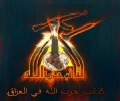 |
| Hezbollah Brigades' logo is nearly identical to that of Lebanese Hezbollah. |
Coalition forces, likely the special operations hunter-killer teams of Task Force 88, have captured nine Hezbollah Brigades operatives during three raids in the Adhamiyah district in Baghdad over the past 24 hours.
The first intelligence-driven raid netted a Hezbollah Brigades cell leader who operated in Basrah. "According to information from suspects already in custody, he is believed to be involved in smuggling weapons and fighters across the Iraq-Iran border," Multinational Forces Iraq reported in a press release. Three other suspected Hezbollah Brigades associates were captured.
The second raid resulted in the capture of Hezbollah Brigades operative behind improvised rocket-assisted mortar (IRAM) attacks in Baghdad. Coalition forces "found weapons, as well as electronics equipment believed to be used in the manufacture of IRAMs" and also detained three other men.
A "propaganda expert" and other member of the Hezbollah Brigades were captured during the third raid. "The man admitted to designing websites for [Hezbollah Brigades] in order for the group to publicize their IRAM attacks on Iraqi and Coalition forces."
This is the third Hezbollah Brigades propaganda specialist captured in the past month. On July 31, Coalition forces detained a cell member who was responsible for videotaping attacks on US and Iraqi forces in Baghdad. On July 21, Coalition forces captured a member of a Hezbollah Brigades propaganda cell who was responsible for uploading attack videos to the Internet in New Baghdad.
The Hezbollah Brigades, or the Kata'ib Hezbollah, has been active for more than a year and has increased its profile by conducting attacks against US and Iraqi forces using the deadly explosively formed penetrators, or EFPs, and improvised rocket-assisted mortars, which have been described as flying improvised explosive devices. The Hezbollah Brigades has posted videos of these attacks on the Internet.
Multinational Forces Iraq said the group receives support from Iran and is an “offshoot of Iranian-trained Special Groups," Sergeant Susan James, a Public Affairs NCO for Multinational Forces Iraq told The Long War Journal in July. The US military has referred to the Iranian-backed elements of the Mahdi Army as the Special Groups. The Hezbollah Brigades is described as "a separate and independent organization from Special Groups,” said James.
“We believe that Hezbollah Brigades does receive support from Iran,” James said. “That support likely includes funding, training, logistics, and material.” Iran's Qods Force funds, trains, arms, and supports Mahdi Army operatives to facilitate attacks on Coalition and Iraqi forces. "They are also believed to receive guidance or direction from the Iranian Revolutionary Guard Corps - Qods Force," Multinational Forces Iraq stated in the latest press release on the capture of nine Hezbollah Brigades operatives in Baghdad.
The logo used by the Hezbollah Brigades is nearly an exact match of the one used by Lebanese Hezbollah, which is directly supported by Iran. The logo shows an arm extended vertically, with the fist grasping an AK-47 assault rifle. US forces captured Ali Mussa Daqduq inside Iraq in early 2007. Daqduq is a senior Hezbollah commander who was tasked with setting up the Mahdi Army Special Groups along the same lines as the Lebanese terror group.
For more information on improvised rocket-assisted mortars, see: Mahdi Army uses “flying IEDs” in Baghdad.



